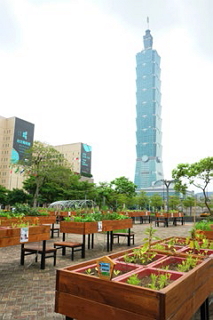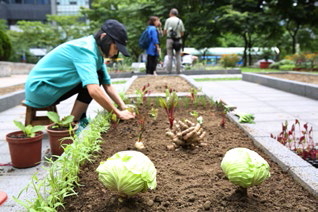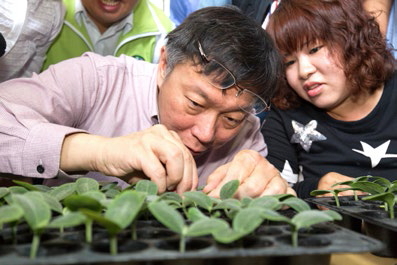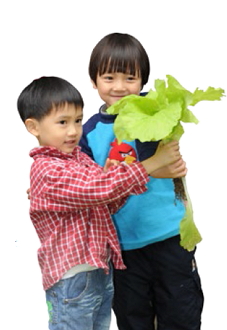Moving Toward a Garden City: Active Planning of More Farming Spaces
Growing Food Brings a Sense of Achievement Ko, who has a medical background, believes that coming into direct contact with plants and the land is a good way of improving physical and psychological healing. At the Wenshan Self-financed Senior Center (文山區老人自費安養中心), 34 senior citizens tend to a rooftop garden. With assistance from the Depar tment of Economic Development (產業發展局), Taipei City Government, this rooftop garden has undergone expansion and volunteers have implemented horticulture training. Wu Meizhao (吳梅兆) has been working in this rooftop garden for the past five years. She says that it allows her to get exercise and enjoy sampling fresh vegetables. Growing vegetables is like raising children; it brings about a great sense of achievement. In the new garden, plants have been placed on shelves so that elderly gardeners can easily tend to them without having to bend down. The Department of Civil Affairs (民政局) , Taipei City Government has also taken inventory of unused land and public spaces in some neighborhoods that can be transformed into green spaces for farming. The Shilin District Office (士林區公所) gave consideration to both the availability of city-owned land and the willingness of residents to get involved. A vacant lot next to the Tianshan Green Space (天山綠地) in Tianshan Li (天山里) was chosen to serve as a farm. Following discussions and proposals from the neighborhood residents, it was nicknamed “Smile Farm (微笑農場).” Chen Yonghong (陳永鴻), chief of Tianshan Li, notes that Smile Farm opened on September 2nd, and the residents took the initiative to carry out planting, watering and pest and disease prevention. Every time the neighborhood residents gather together for discussions, there is a feeling of happiness and enthusiasm. It is as if they have returned to their childhood days growing up on a farm. Students Roll Up Their Sleeves and Tend to the Fields In order to give the children living in this urban area an appreciation and awareness of local foods, the Department of Education (教育局), Taipei City Government has formulated the “little farm project (小田園計畫).” The original idea was to include one school from each administrative district. However, there was unanticipated enthusiasm, and 230 schools received approval and entered the trial phase. Yingqiao Elementary School (螢橋國小) was the first to plant paddy rice. Since March, under the guidance of the principal and teachers, students in the middle and higher grades have planted rice, as well as sweet potatoes, pumpkins and papaya. After one semester of diligent care, the rice was ready for harvest during the summer vacation. The school specially organized a program for the fifth and sixth grade students to experience harvesting, threshing and drying of rice as a means of passing on an understanding of “the hard work of farmers that goes into putting each grain of rice on their plates.” With the extreme climate, draining of energy resources and increasing population, the world is on the brink of a food crisis. People in countries all over the world are using their own methods to cultivate food. In international cities, such as London, Paris, Vancouver, San Francisco, Seattle, New York, Boston and Tokyo, people are tilling the land and growing crops in vacant lots next to skyscrapers and implementing various edible landscape policies. Since taking office, Taipei Mayor Ko Wen-je has worked to transform Taipei into a garden city. City residents are provided with land and guidance for planting and harvesting crops to experience the joy of urban farming.
With the extreme climate, draining of energy resources and increasing population, the world is on the brink of a food crisis. People in countries all over the world are using their own methods to cultivate food. In international cities, such as London, Paris, Vancouver, San Francisco, Seattle, New York, Boston and Tokyo, people are tilling the land and growing crops in vacant lots next to skyscrapers and implementing various edible landscape policies. Since taking office, Taipei Mayor Ko Wen-je has worked to transform Taipei into a garden city. City residents are provided with land and guidance for planting and harvesting crops to experience the joy of urban farming.

 Under the promotional efforts of Ko’s city government team, city residents both old and young can engage themselves in farming in this concrete jungle which is a real-life version of the online game Happy Farm. In many places in this cement city, green plants are growing and flowers are blooming. Taipei is once again modeling itself as a capital of sustainable ecological development, meaning that this was not just a policy put down on paper.
Under the promotional efforts of Ko’s city government team, city residents both old and young can engage themselves in farming in this concrete jungle which is a real-life version of the online game Happy Farm. In many places in this cement city, green plants are growing and flowers are blooming. Taipei is once again modeling itself as a capital of sustainable ecological development, meaning that this was not just a policy put down on paper.

![Taiwan.gov.tw [ open a new window]](/images/egov.png)
